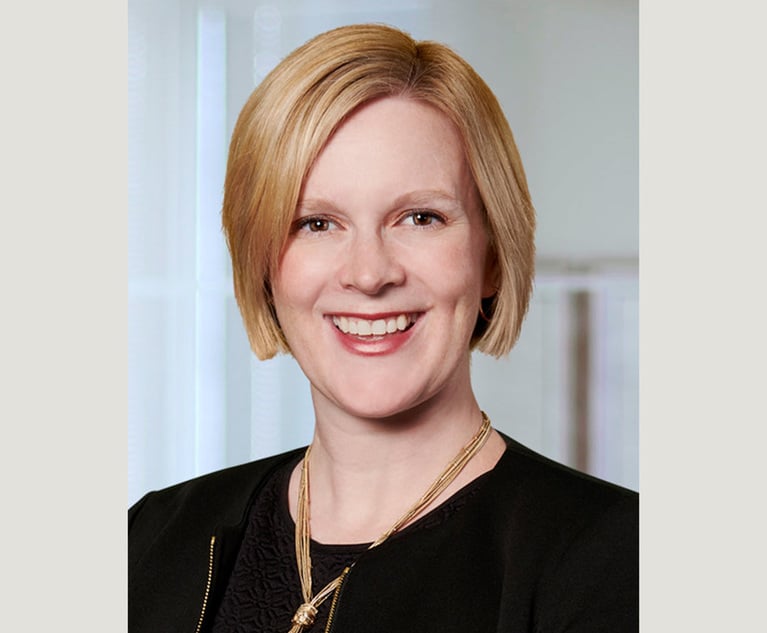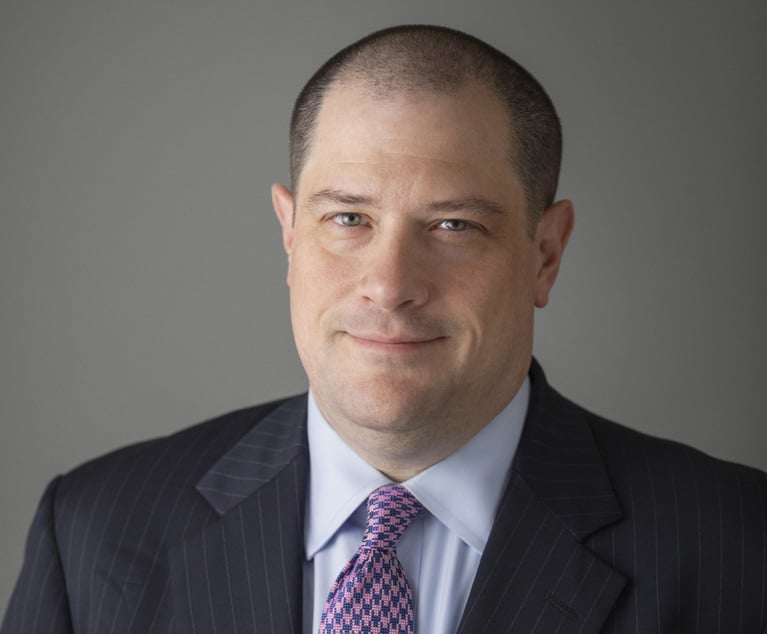How Much Business Do You Really Need to Make a Lateral Move?
In the past few years, the word on the street is that you need $4 million or $5 million to start a conversation with a prospective firm. Really?
January 28, 2020 at 01:53 PM
5 minute read
The original version of this story was published on The American Lawyer
 Photo: Shutterstock
Photo: Shutterstock
Lateral partners are hot, hot. Firms want rainmakers, and anyone with business or potential for business seem to be for sale. And even if you're content at your current firm or the hopelessly faithful type, most lawyers want to think that they can go elsewhere if they choose.
So what's the deal? Can you move? Or are you stuck?
In the last few years I've heard two persistent rumors about the lateral partner market:
- Major firms won't give you the time of day unless you come to the door with $5 million or so in business.
- Female and diverse partners are in high demand, and firms will pull out all the stops to get them.
First, let's talk about the book of business you need. For a long time, $1 million was the magic number. But in the past few years, the word on the street is that you need $4 million or $5 million to start a conversation with a prospective firm—and if you have less than that amount, you might as well stay put and crawl back into your hole.
Before I go further, let's give respect and love to those who try to develop business—of any amount. As anyone who's made the effort will tell you, reaching $100,000 in originations isn't easy, and hitting the $1 million mark is a huge deal.
 The good news is that $1 million in business isn't as shabby as you might have been led to believe. Although firms would like to give the impression that they're too elite to consider lateral partners with a mere $1 million or $2 million of business, reality tells a different story.
The good news is that $1 million in business isn't as shabby as you might have been led to believe. Although firms would like to give the impression that they're too elite to consider lateral partners with a mere $1 million or $2 million of business, reality tells a different story.
What jumped out at me about the 2020 Lateral Partner Satisfaction Survey by Major, Lindsey & Africa is how modest the book of business is for most lateral partners. In fact, of the 1,367 lateral partner respondents in Major Lindsey's survey, 52.7% reported projected level of originations of less than $1 million in their first full year, followed by 27% who projected $1 million to $1.99 million.
And how many in that coveted $3 million to $4.99 million category? Just 6%. As you'd expect, those with originations in higher ranges are extremely rare: 3% for the $5 million to $7.99 million group, and 1% in the uber-elite $10 million or more group.
So why the jacked-up numbers on how much business laterals need? "If it's a highly profitable firm—where the average partner is making $2 million or more—you need a substantial practice," says Jon Lindsey, a founder of Major Lindsey and the author of the lateral survey, explaining the origins of the $4 million to $5 million figure.
One reason so many lateral partners reported business with less than $1 million, adds Lindsey, is that "30% of the respondents are from outside of 15 largest markets." Moreover, some moved as part of a group or through mergers, so "inevitably there are service partners in the mix."
That said, there are cases where the book of business is irrelevant. Lindsey cites elite government lawyers like Jeannie Rhee, who worked for special prosecutor Robert Mueller, leading the team that investigated Russian influence on the 2016 presidential election. Lindsey, who placed Rhee into Paul, Weiss, Rifkind, Wharton & Garrison, calls her "brilliant."
But even those less pedigreed than Rhee can break through the lateral door without much business—maybe.
"In areas like private equity and fund formation, which are about relationships, firms might take a bet," says Patty Morrissy, a managing director of search firm Mlegal. "Sometimes no book is required if a firm needs a certain skill set to meet client demand," though she says $1 million is generally regarded as the floor to open discussions.
And what about the hype surrounding women and diverse lawyers—are firms willing to make exceptions about their books of business to lure them over?
Not really.
"Yes, women lawyers are in very high demand, but book requirements are equal," says Morrissy. "They all want women and will do whatever they can on the fringes, like a thumb on the scale when it comes to compensation or bonus." She says she's doing two searches now where the mandate is to find female partners. "It's a good time for women," she says.
Sometimes firms will make the extra effort to hire women or diverse candidates, then pull back. "Some years ago, I worked with a firm that had bad press on diversity, and I presented a diverse lawyer who had an eminent practice and a decent book of business, but the response from the firm was: 'His law school grades [are] not very good.'"
I can make a guess about the identity of the firm, but I'll stop myself for now.
Most firms probably will not even look at a partner candidate's grades, but they will scrutinize the business potential of the lateral very closely. "When push comes to shove, firms are worried about their profits being diluted," says Lindsey. "Often at very end, firms will come back and say, 'We can't make this hire work with our numbers.'"
The upshot: Keep working on your book of business, but don't expect any favors because you're a female or diverse lawyer—no matter what firms tell you about their tireless efforts to promote gender equality and diversity.
Contact Vivia Chen at [email protected]. On Twitter: @lawcareerist.
This content has been archived. It is available through our partners, LexisNexis® and Bloomberg Law.
To view this content, please continue to their sites.
Not a Lexis Subscriber?
Subscribe Now
Not a Bloomberg Law Subscriber?
Subscribe Now
NOT FOR REPRINT
© 2024 ALM Global, LLC, All Rights Reserved. Request academic re-use from www.copyright.com. All other uses, submit a request to [email protected]. For more information visit Asset & Logo Licensing.
You Might Like
View All
Less Is More: The Risks of Excessive Data Collection from Mobile Devices
6 minute read
How My Postpartum Depression Led to Launching My Firm’s Parental Leave Coaching Program
9 minute read
Protecting Attorney-Client Privilege in the Modern Age of Communications
6 minute readLaw Firms Mentioned
Trending Stories
- 1Judge Denies Sean Combs Third Bail Bid, Citing Community Safety
- 2Republican FTC Commissioner: 'The Time for Rulemaking by the Biden-Harris FTC Is Over'
- 3NY Appellate Panel Cites Student's Disciplinary History While Sending Negligence Claim Against School District to Trial
- 4A Meta DIG and Its Nvidia Implications
- 5Deception or Coercion? California Supreme Court Grants Review in Jailhouse Confession Case
Who Got The Work
Michael G. Bongiorno, Andrew Scott Dulberg and Elizabeth E. Driscoll from Wilmer Cutler Pickering Hale and Dorr have stepped in to represent Symbotic Inc., an A.I.-enabled technology platform that focuses on increasing supply chain efficiency, and other defendants in a pending shareholder derivative lawsuit. The case, filed Oct. 2 in Massachusetts District Court by the Brown Law Firm on behalf of Stephen Austen, accuses certain officers and directors of misleading investors in regard to Symbotic's potential for margin growth by failing to disclose that the company was not equipped to timely deploy its systems or manage expenses through project delays. The case, assigned to U.S. District Judge Nathaniel M. Gorton, is 1:24-cv-12522, Austen v. Cohen et al.
Who Got The Work
Edmund Polubinski and Marie Killmond of Davis Polk & Wardwell have entered appearances for data platform software development company MongoDB and other defendants in a pending shareholder derivative lawsuit. The action, filed Oct. 7 in New York Southern District Court by the Brown Law Firm, accuses the company's directors and/or officers of falsely expressing confidence in the company’s restructuring of its sales incentive plan and downplaying the severity of decreases in its upfront commitments. The case is 1:24-cv-07594, Roy v. Ittycheria et al.
Who Got The Work
Amy O. Bruchs and Kurt F. Ellison of Michael Best & Friedrich have entered appearances for Epic Systems Corp. in a pending employment discrimination lawsuit. The suit was filed Sept. 7 in Wisconsin Western District Court by Levine Eisberner LLC and Siri & Glimstad on behalf of a project manager who claims that he was wrongfully terminated after applying for a religious exemption to the defendant's COVID-19 vaccine mandate. The case, assigned to U.S. Magistrate Judge Anita Marie Boor, is 3:24-cv-00630, Secker, Nathan v. Epic Systems Corporation.
Who Got The Work
David X. Sullivan, Thomas J. Finn and Gregory A. Hall from McCarter & English have entered appearances for Sunrun Installation Services in a pending civil rights lawsuit. The complaint was filed Sept. 4 in Connecticut District Court by attorney Robert M. Berke on behalf of former employee George Edward Steins, who was arrested and charged with employing an unregistered home improvement salesperson. The complaint alleges that had Sunrun informed the Connecticut Department of Consumer Protection that the plaintiff's employment had ended in 2017 and that he no longer held Sunrun's home improvement contractor license, he would not have been hit with charges, which were dismissed in May 2024. The case, assigned to U.S. District Judge Jeffrey A. Meyer, is 3:24-cv-01423, Steins v. Sunrun, Inc. et al.
Who Got The Work
Greenberg Traurig shareholder Joshua L. Raskin has entered an appearance for boohoo.com UK Ltd. in a pending patent infringement lawsuit. The suit, filed Sept. 3 in Texas Eastern District Court by Rozier Hardt McDonough on behalf of Alto Dynamics, asserts five patents related to an online shopping platform. The case, assigned to U.S. District Judge Rodney Gilstrap, is 2:24-cv-00719, Alto Dynamics, LLC v. boohoo.com UK Limited.
Featured Firms
Law Offices of Gary Martin Hays & Associates, P.C.
(470) 294-1674
Law Offices of Mark E. Salomone
(857) 444-6468
Smith & Hassler
(713) 739-1250









